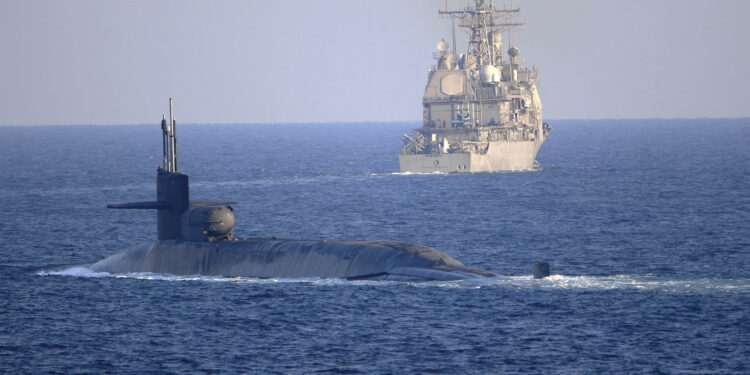Writer Elizabeth Brau said in a report published by the American magazine “Foreign Policy” that commercial shipping companies fear the outbreak of a new tanker war in the Strait of Hormuz due to the recent American escalation by America striking sites in Syria and Iraq on the second of this month.
The writer stated that the United States hopes that the strikes will send a clear message to Iran without escalating the indirect conflict into a direct one, and other retaliatory actions may follow.
US President Joe Biden confirmed on January 30 that he did not want escalation, saying, “I do not think we need a broader war in the Middle East. This is not what I am looking for.”
She referred to what US National Security Council spokesman John Kirby said on January 31: “It will not be just a one-time event,” adding that “the first thing you see will not be the last.”
The Strait of Hormuz is becoming more dangerous
The writer commented that even if the fighting did not spread, the strait would have become much more dangerous, adding that commercial ships depend heavily on this waterway, one side of which Iran controls and regularly harasses cargo ships.
The Strait of Hormuz is a very important waterway. In 2022, 21 million barrels of oil passed through the Strait daily, which is equivalent to 21% of the world’s global oil liquids consumption.
The strait is also a checkpoint, a narrow body of water divided between Iran and Oman, where traffic can easily be disrupted by storms, accidents, or intentional actions by the parties involved.
It brought to mind that during the Iran-Iraq war in the 1980s, the Arabian Gulf and the Strait of Hormuz were invaded by what became known as the “tanker war.” It was a brutal war, as countries – especially Iraq – targeted commercial ships with missiles and mines, and ships flying the flags of Cyprus and Greece were attacked. , Iran, Japan, Kuwait, Liberia, Malta, Norway, Panama, Saudi Arabia, Singapore, Turkey, the United Kingdom and other countries to attack.
Heavy losses of the First Tanker War
The report stated that this tanker war resulted in the killing, wounding, or loss of more than 320 commercial sailors, while 340 commercial ships were damaged, some of them more than once. About 30 million tons of ships were damaged, 11 ships sank, and total losses were announced in 30 ships.
The writer said that although the tanker war was not Iran’s idea, the Iranians learned a clear lesson from it: as long as the world needs oil, ships will need to go to the Arabian Gulf, and this gives Tehran an ideal opportunity to target ships of its choice, and this is in fact what it has been increasingly doing. Over the past five years.
The oil industry assesses the risks
She explained that the shipping industry is currently evaluating the risks of further attacks in the strait, and quoted the head of DNK Marine Insurance, Sven Ringbakken, as saying that they discussed this matter at length, and concluded that it is likely that Iran will exploit this opportunity to attack ships.
Ringbakken noted that the Iranians could choose to do this surreptitiously. “They could hide behind plausible deniability and pretend that the interference is related to a previous incident, smuggling or something similar, or carry out attacks outside their waters, as happened in 2019,” when four oil tankers were hit in May. The year was attacked off the UAE port of Fujairah, near the southern end of the Strait of Hormuz.
The writer added that as long as Iran does not declare war on the United States or other countries associated with ships sailing inside and outside the Strait of Hormuz, the US Navy or other countries cannot do much to protect shipping there.
Western forces will do little more than observe
The writer quoted Ringbaken as saying that US naval forces and others can monitor and perhaps intervene in international waters, but there is nothing more that they can do.
The report also included a statement by Neil Roberts, Secretary of the Joint War Committee of the Marine Insurance Industry, which evaluates maritime risks, in which he said that Iran has proven its capabilities, but it will not benefit from closing the Strait of Hormuz, and for this reason it was keen to keep its previous actions limited.
The writer said that Iran does not need to try to close the strait, but rather it can only indicate that the risks to commercial shipping there are about to increase.
She added that if Iran escalates significantly to the point that a new tanker war breaks out, the shipping industry and its insurance companies will have to make dramatic calculations. The Houthi attacks in the Red Sea have already increased the risks to sailors, but the increasing attacks on shipping in The Strait of Hormuz would be much more dangerous.



